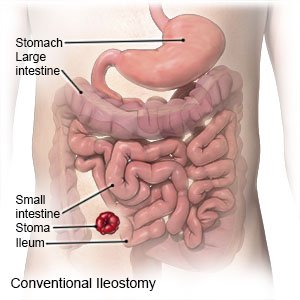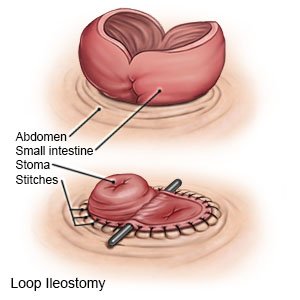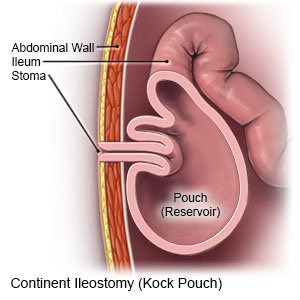Ileostomy Creation
Medically reviewed by Drugs.com. Last updated on Apr 6, 2025.
AMBULATORY CARE:
What you need to know about ileostomy creation:
An ileostomy is an opening made on the surface of your abdomen. The lower part of your small intestine is the ileum. It is brought through the opening in your abdomen. A stoma (opening) is made from your ileum to allow you to have bowel movements. Your ileostomy may be temporary or permanent. An ileostomy is done to treat intestinal conditions such as Crohn disease, ulcerative colitis, and colorectal cancer.
What will happen before your surgery:
- Your surgeon will make a plan a few weeks before surgery for where to place your stoma. You will also meet with an ostomy specialist to tell you what to expect after surgery.
- You will need to clean out your bowels to prepare your intestines for surgery. Your surgeon will tell you when to switch to clear liquids only. You may also need to use laxatives or an enema the night before surgery. You may be told not to eat or drink for 12 hours before your surgery.
- Tell your surgeon about all your current medicines. Your surgeon may have you stop certain medicines weeks before your surgery. Examples include blood thinners and NSAIDs, such as ibuprofen. These medicines can cause you to bleed more than expected during surgery. Your surgeon will tell you which medicines to take or not take on the day of surgery.
- Tell your surgeon about any allergies you have, including to medicines or anesthesia.
What will happen when you meet with an ostomy specialist:
Bring a family member or friend with you to learn how to help you. Write down any questions you may have so you will remember to ask them during your meetings.
- The ostomy specialist will talk with you about lifestyle changes that happen with an ileostomy.
- The specialist will explain how to prevent problems such as bowel movement leakage. You will learn stoma care to prevent a rash or infection around the stoma.
- The specialist will talk about the supplies you will need for your ileostomy. The specialist will show you how to change the ostomy bag.
- The specialist may also talk about your nutrition, bathing, and other activities after surgery.
- You may meet other people who have an ileostomy.
What will happen during your surgery:
General anesthesia will be given to keep you asleep and pain-free during your surgery. Your surgeon may do any of the following, depending on if your ileostomy will be temporary or permanent:
- For a conventional ileostomy, an incision will be made in your abdomen. Your surgeon will separate your colon (lower part of your intestine) from your ileum and stitch your colon closed. Your surgeon will bring the end of your ileum through the hole in your abdomen. Then it will be folded back and stitched to the skin of your abdomen to create the stoma.

- A loop ileostomy will be created if it will be temporary. Your surgeon will bring a small section of your ileum through the hole in your abdomen. An incision will be made through one side of the ileum. Then your surgeon will fold it back and stitch it to the skin on your abdomen to create the stoma. A small rod may be placed near your stoma to secure it to your abdomen. The rod will be removed when your stoma heals.

- For a continent ileostomy, your surgeon will create a reservoir from a part of your ileum. It will be inside your body and will attach to the stoma on your abdomen. It will collect bowel contents and can be emptied with a tube as needed.

What will happen after your surgery:
You will stay in the hospital for up to 10 days. You will have to walk several times per day while in the hospital. You will be taught how to take care of your ileostomy.
Risks of an ileostomy:
- Surgery may cause bleeding or damage to nearby organs. A fistula (abnormal tissue connection) may form between your intestines and another organ. Your intestines may stop working for a period of time after surgery. You may get a life-threatening blood clot in your leg or arm.
- Your stoma or part of your intestines may become narrow or blocked. The stitches securing your ileostomy may come loose. Your stoma may slip back into your body, or come out too far on your abdomen. The rod holding your stoma in place may create a hole in your skin. You may get an infection in your intestines, reservoir pouch, urinary tract, or the skin around your stoma. The skin and intestine that forms your stoma may die. You could get a hernia (intestine that pushes through a weakened abdominal muscle wall). An ileostomy may increase your risk for dehydration.
- Your ileum may be damaged. Bowel contents may leak into your abdomen and cause a life-threatening infection.
Call your local emergency number (911 in the US) if:
- You are short of breath or have chest pain.
- Your abdomen becomes hard and painful.
Drugs used to treat this and similar conditions
Sandostatin
Sandostatin is used to treat acromegaly and to reduce flushing episodes and watery diarrhea caused ...
Sandostatin LAR Depot
Sandostatin LAR Depot is used for acromegaly, carcinoid tumor, vasoactive intestinal peptide tumor
Ozempic
Learn about Ozempic (semaglutide) for type 2 diabetes treatment, weight management, cardiovascular ...
Bynfezia Pen
Bynfezia Pen (octreotide) is used to treat acromegaly and to reduce flushing episodes and watery ...
Octreotide
Octreotide systemic is used for acromegaly, carcinoid tumor, diabetes, type 1, diarrhea, dumping ...
Seek care immediately if:
- Your arm or leg feels warm, tender, and painful. It may look swollen and red.
- You cannot stop vomiting.
- The color of your stoma turns to gray or black.
- Bowel contents will not drain through your stoma.
Call your surgeon or ostomy specialist if:
- You have a temperature of 101ºF (38.3ºC) or higher.
- Your incision wound or stoma is red, swollen, and has foul-smelling drainage.
- You have more bowel contents draining from your stoma than is normal for you.
- Your stoma becomes narrow, comes out too far, or sinks inside your abdomen.
- You have questions or concerns about your condition or care.
Medicines:
- Prescription pain medicine may be given. Ask your healthcare provider how to take this medicine safely. Some prescription pain medicines contain acetaminophen. Do not take other medicines that contain acetaminophen without talking to your healthcare provider. Too much acetaminophen may cause liver damage. Prescription pain medicine may cause constipation. Ask your healthcare provider how to prevent or treat constipation.
- Take your medicine as directed. Contact your healthcare provider if you think your medicine is not helping or if you have side effects. Tell your provider if you are allergic to any medicine. Keep a list of the medicines, vitamins, and herbs you take. Include the amounts, and when and why you take them. Bring the list or the pill bottles to follow-up visits. Carry your medicine list with you in case of an emergency.
After surgery self-care:
- Do not lift more than 10 pounds for 4 weeks or as directed. Also, avoid bending and twisting. This will help your surgery area heal and decrease your risk for a hernia.
- Prevent blood clots and pneumonia. Walk around the inside of your house at least every 2 hours.
- Check your stoma every day. Check for signs of infection such as redness, swelling, and drainage.
- Do not drive until your healthcare provider says it is okay.
Work with an ostomy specialist:
An ostomy specialist can provide more information on how to care for your ileostomy. He or she will help select the right size and type of pouch for your ileostomy to prevent problems. You may need a different size pouch after your stoma heals. He or she will also know how and where to get the supplies you need, and which supplies are best.
Wound and stoma care:
Ask your healthcare provider or ostomy specialist for more information about the following ileostomy care steps:
- Carefully wash your incision wound and stoma with warm water. If you use soap, make sure to rinse it off well. Dry the area and put on new, clean bandages as directed and when you change your bag. Change your bandages when they get wet or dirty. Ask your ostomy specialist or healthcare provider for more information on ileostomy care.
- Empty your bag when it is 1/3 to 1/2 full. If your pouch is too full, it may become heavy and pull on your skin.
- Follow directions for how often to change your ileostomy bag. This will help prevent damage to your stoma and skin. How often you need to change the pouch depends on the kind of pouch you have.
- Use a skin-sealant as directed. This is used to prevent leaks and protect your stoma from becoming irritated by bowel contents.
- Follow the directions given to you for care of an internal reservoir. You may need to empty the reservoir 3 to 4 times each day. Empty bowel contents with a thin tube. Do not use medicines that contain wax. The wax can build up in the pouch and block your stoma. Ask your healthcare provider if you are taking any medicines that contain wax.
- Carry extra supplies with you in case your bag leaks. Supplies may include extra pouches, skin protection products, or a change of clothing.
Nutrition to reduce symptoms:
- Eat a small amount of food at a time. Eat foods high in fiber, such as bran cereals, vegetables, and whole-grain breads. Take small bites and chew your food well. Do not have prune juice or cabbage. They may make your bowel contents more liquid and can lead to dehydration.
- Drink liquids as directed. You may need to drink about 1 to 2 extra glasses of liquid each day to prevent dehydration. Ask your healthcare provider how much liquid you should drink each day.
- Try not to swallow air. Smoking, chewing gum, or drinking quickly or through a straw may cause you to swallow air. It can cause gas, and lead to more odor from your stoma.
Follow up with your surgeon or ostomy specialist as directed:
You will need to return to have your ileostomy checked and to make sure the stoma is healing. You may also need more tests. Write down your questions so you remember to ask them during your visits.
© Copyright Merative 2025 Information is for End User's use only and may not be sold, redistributed or otherwise used for commercial purposes.
The above information is an educational aid only. It is not intended as medical advice for individual conditions or treatments. Talk to your doctor, nurse or pharmacist before following any medical regimen to see if it is safe and effective for you.
Further information
Always consult your healthcare provider to ensure the information displayed on this page applies to your personal circumstances.
